A Comprehensive Guide to Autism Assessment Expenses and Resources
Autism evaluations are essential steps for diagnosing autism spectrum disorder (ASD), providing clarity and access to needed support. However, understanding the costs involved can be complex, influenced by various factors such as location, provider credentials, and assessment scope. This guide explores the typical costs associated with autism evaluations, what influences these expenses, the role of insurance, and available resources to help offset costs, enabling families and individuals to make informed decisions.
Overview of Autism Evaluation Costs
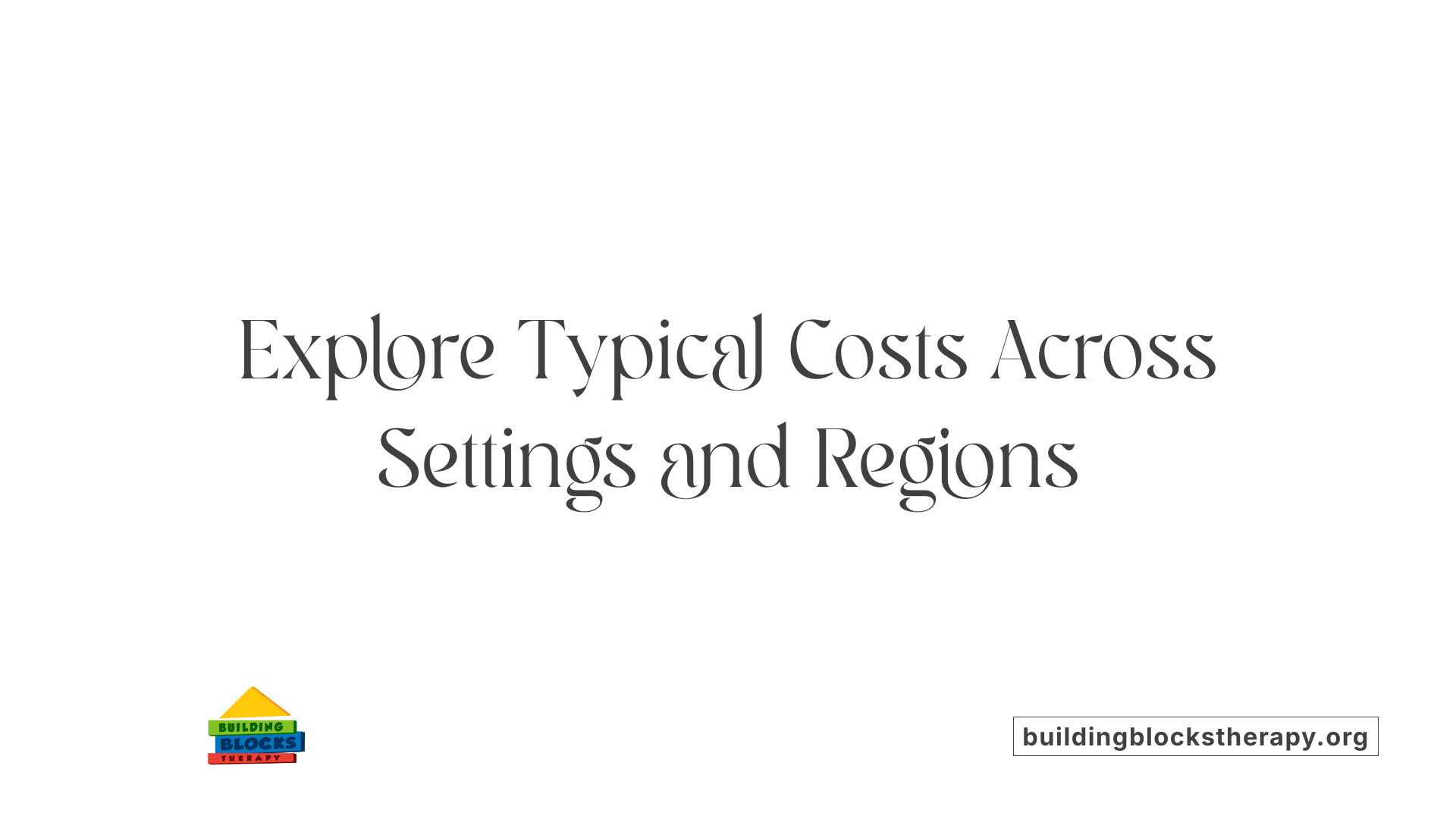
Typical price ranges in different settings
The cost of autism evaluations can vary widely based on the setting and geographic location. In California, basic autism screening tests generally start at around $1,000 and can go up to $3,000 or more. For comprehensive evaluations that include multiple assessments and detailed reports, prices often range from $2,500 to $5,000. Major cities like Los Angeles and San Francisco tend to have higher fees, with some evaluations reaching up to $10,000 in certain cases.
Comparison between screening and comprehensive assessments
Screening tests are designed to provide a quick overview of autism traits and usually cost between $0 and $500. They are often used initially to determine if further testing is needed. Full diagnostic evaluations, which involve extensive testing, interviews, and observations, generally cost between $1,000 and $3,000 at clinics. These comprehensive assessments can include standardized tests, behavioral assessments, and developmental histories, making them more detailed and expensive.
Variations based on provider qualifications and location
Cost differences largely depend on the qualifications of the professional conducting the assessment. Psychologists, developmental pediatricians, psychiatrists, and neuropsychologists all charge different rates, from about $2,000 up to $9,000. Additionally, geographic location impacts billing; urban areas like Los Angeles or San Francisco tend to have higher costs than more rural regions or smaller towns. Insurance coverage can significantly lower out-of-pocket expenses. Many plans cover part or all of the evaluation costs, particularly in California where laws mandate coverage for autism-related services.
| Evaluation Type | Typical Cost Range | Influencing Factors | Additional Notes |
|---|---|---|---|
| Autism Screening | $0 – $500 | Provider type, location | Usually initial, brief screening |
| Developmental Evaluation | $1,500 – $4,000 | Assessment complexity, provider | Broader developmental overview |
| Full Diagnostic Evaluation | $2,500 – $5,000 | Assessment tools, length, professional expertise | Complete diagnosis and reports |
| Adult Autism Assessment | Average $485 | Shorter, targeted assessment | Focused on traits, less comprehensive |
Important considerations
Understanding the cost structure and insurance options is essential before scheduling evaluations. Many providers offer sliding scale fees, and some community or state programs may provide free or reduced-cost services. Verifying insurance coverage, exploring financial assistance programs, and knowing the scope of the assessment can help navigate expenses effectively.
For further details on costs, including nationwide differences and tips on financial assistance, searching terms like "Cost of autism evaluation without insurance in California and nationwide" can provide useful insights.
Factors Influencing Evaluation Expenses
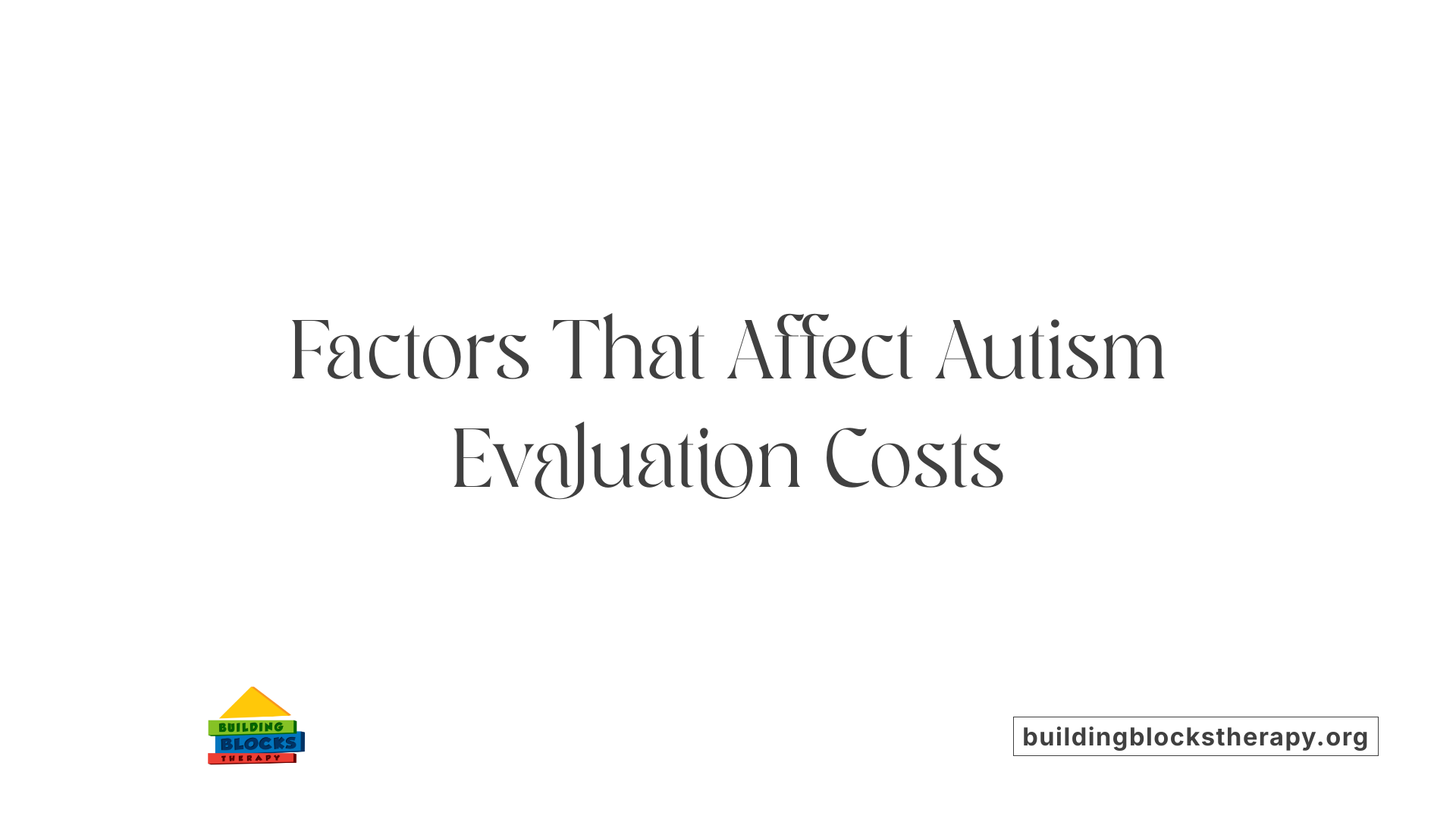
Is an autism assessment expensive?
Autism assessment costs can vary widely depending on the provider, location, and assessment components. Generally, the price ranges from about $1,000 to $5,000, with more comprehensive evaluations costing up to $4,000 or $5,000. Some clinics and providers charge higher fees, especially for evaluations conducted by highly experienced professionals, and costs may be higher in certain areas or at specialized facilities like UCLA.
Insurance coverage can help offset these costs, with some plans covering part or all of the assessment, although out-of-pocket expenses may still apply. Additionally, there are low-cost or free options available through university clinics, community health centers, and public school evaluations for those who qualify.
Factors that influence evaluation costs include:
| Factor | Description | Details/Examples |
|---|---|---|
| Provider Qualifications and Experience | More experienced or highly qualified professionals may charge higher fees | Neuropsychologists and senior psychologists tend to cost more than general pediatricians or less specialized practitioners |
| Type of Assessment Tools Used | Advanced, comprehensive assessments with multiple tools are generally more costly | Standardized tests, behavioral observations, and video reviews affect cost |
| Age of the Individual Being Evaluated | Evaluations for adults tend to be shorter and less expensive than those for children | Adult assessments usually cost around $485, whereas child evaluations can range higher |
| Length and Complexity of the Evaluation | Longer and more detailed evaluations, including multiple visits, add to the total cost | Full assessments with multiple components can reach $3,500 or more |
| Geographical Location and Regional Cost Differences | Costs are higher in metropolitan areas like San Francisco or Los Angeles | Costs tend to be lower in regions like Riverside or Fresno |
Understanding these factors can help families better plan and anticipate expenses associated with autism diagnosis, whether they are considering clinic evaluations, private practitioners, or community resources.
Insurance Coverage and Legal Mandates
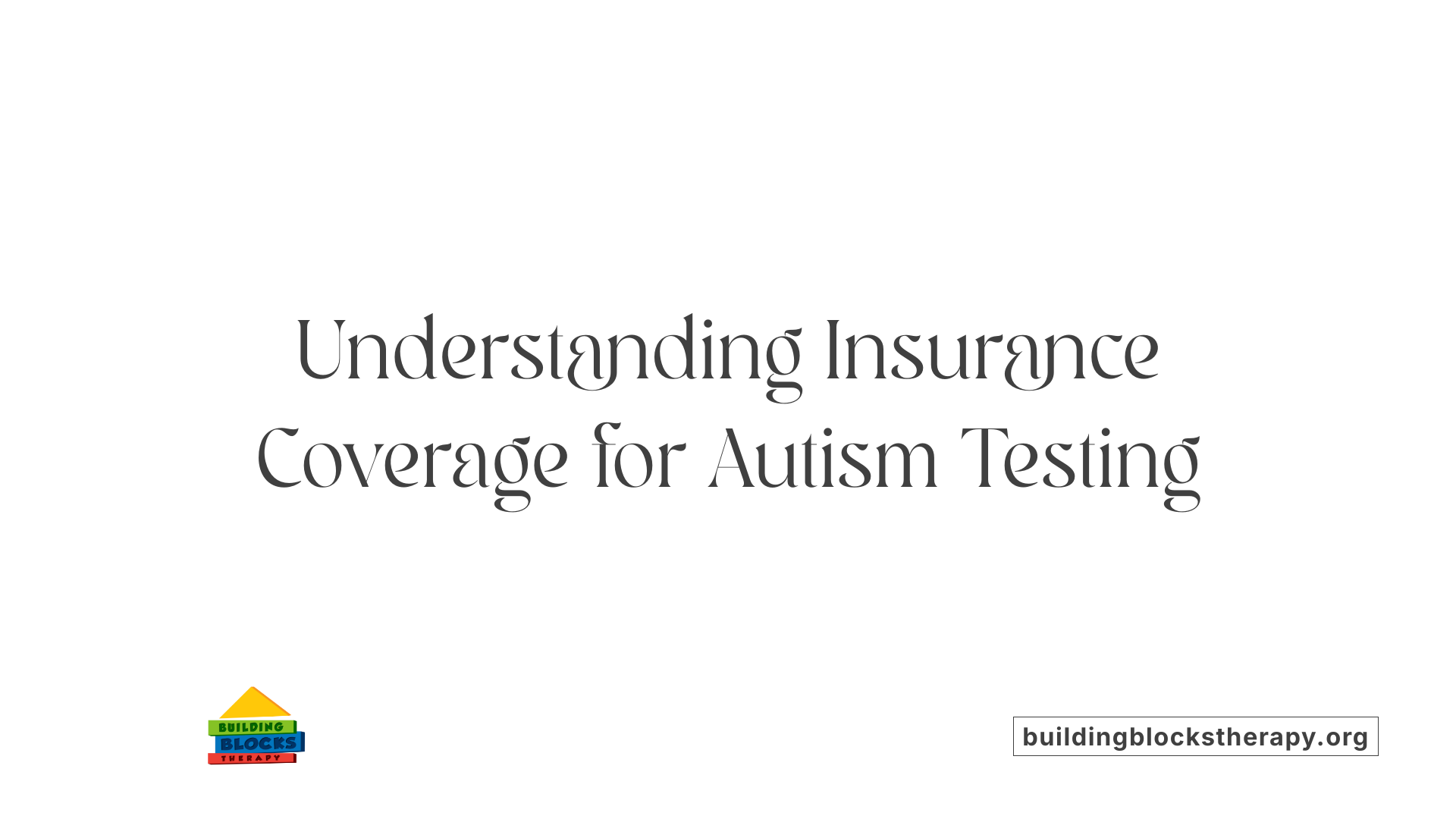
Does insurance cover autism testing for children and adults?
Insurance coverage for autism testing can differ widely based on the insurance plan, provider, and regional regulations. In California, state laws like SB 946 require insurance companies to cover autism-related services, including diagnostic evaluations, for both children and adults. Many private insurance plans, Medicaid, and Medicare include some level of coverage for autism assessments, but the extent varies.
For children, coverage tends to be more comprehensive, often encompassing behavioral assessments, developmental screenings, and full diagnostic evaluations. Adults seeking assessment services typically encounter more variability; some insurance plans cover targeted evaluations, while others may not. Copayments, deductibles, and approval processes like pre-authorization can affect out-of-pocket costs.
It is essential for individuals and families to verify their specific plan benefits. Contacting the insurance provider directly or reviewing policy documents ensures understanding of what assessments are covered, any limitations, and the procedures for obtaining approval. Being prepared with necessary documentation, such as referral letters or medical records, can streamline the process.
Overall, while many insurance policies provide coverage for autism testing, the details differ substantially. Checking coverage options before scheduling appointments helps avoid unexpected expenses and allows families to plan financially for the assessment process.
Financial Assistance and Support Programs
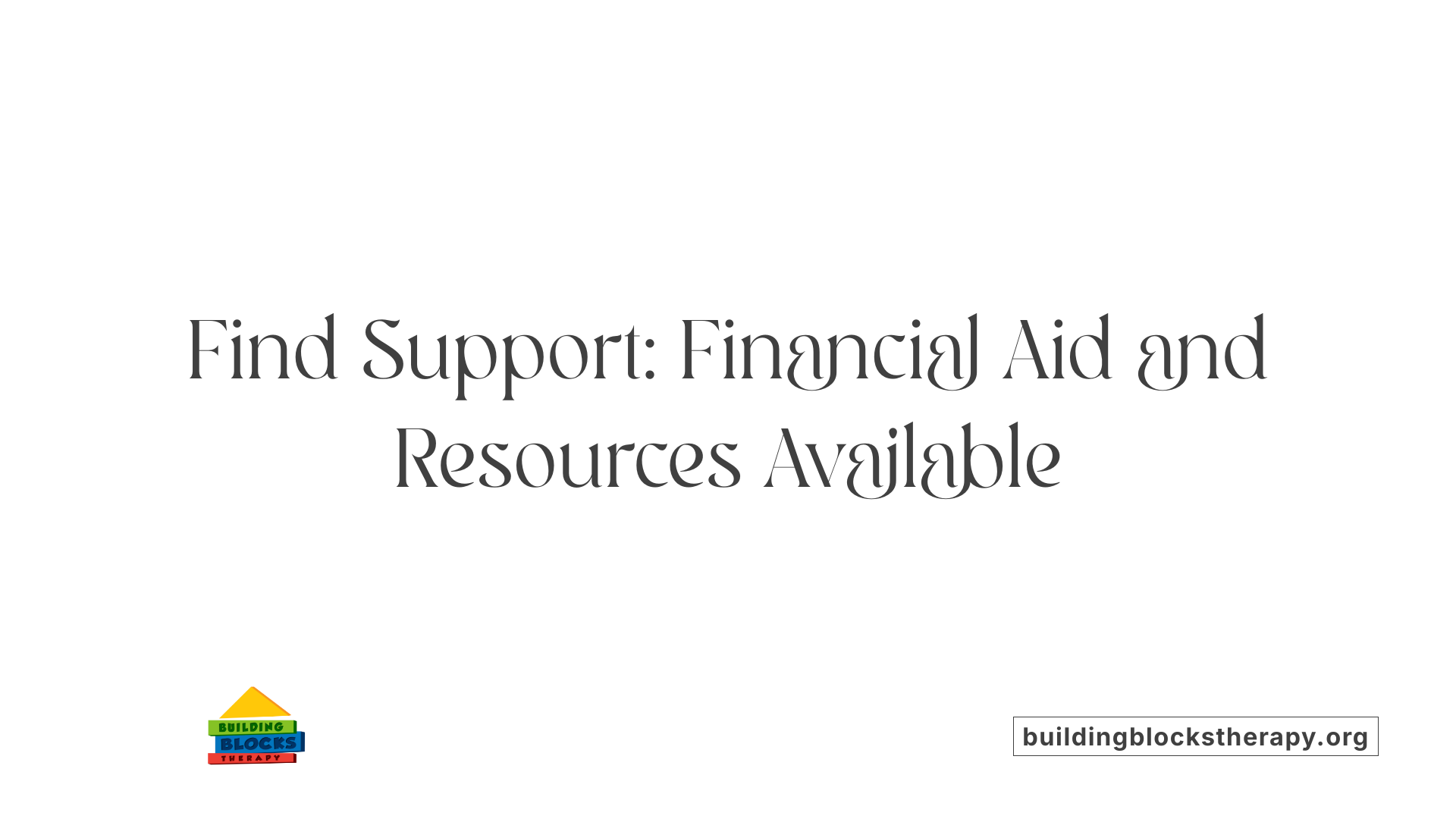 Are there financial resources to help cover autism evaluation costs?
Are there financial resources to help cover autism evaluation costs?
Yes, families in California and beyond can access several options to offset the expenses of autism testing and diagnosis. Federal and state programs like Medicaid and Supplemental Security Income (SSI) are available to support individuals who qualify based on income and other criteria. These programs often cover part or all of the costs associated with autism evaluations and subsequent services.
In addition to government support, nonprofit organizations play a significant role in providing financial aid. Organizations such as the Anchor of Hope Foundation and Autism Care Today offer grants, scholarships, and other financial assistance programs to families seeking diagnosis and support services. These grants help cover the costs of assessments, which can range from $1,000 to over $5,000 depending on the region and provider.
Community resources are also vital in reducing costs. California's regional centers frequently provide free or low-cost evaluation services for eligible children. Early intervention programs at the local level sometimes include assessments that are either free or require a minimal fee, especially for low-income families.
Furthermore, many clinics and healthcare providers offer sliding scale fees. These are adjusted based on household income, making diagnostic testing more accessible for families facing financial challenges. Payment plans and billing assistance programs are also common, helping spread out costs or navigate insurance billing processes.
Overall, multiple avenues are available to support families and adults in obtaining autism diagnoses without undue financial hardship, ensuring timely access to necessary interventions and services.
Understanding the Evaluation Process and What to Expect
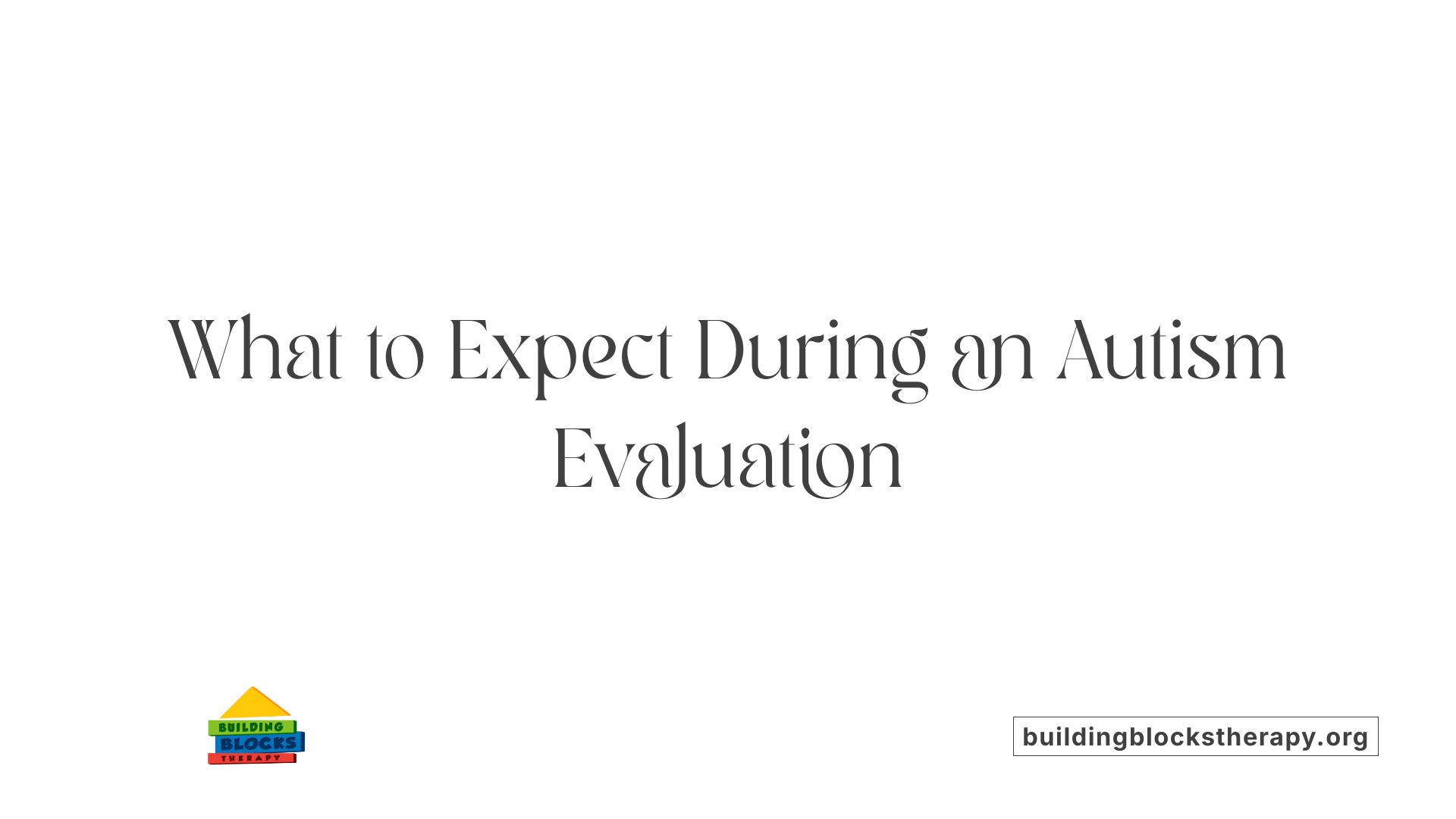
What should I expect during an autism evaluation?
An autism evaluation is a thorough process carried out by trained professionals to understand an individual's developmental profile. You can anticipate multiple steps involving interviews, questionnaires, and direct observations.
The process usually begins with gathering developmental history, where the clinician asks about early development, communication, social interactions, and sensory behaviors. Standardized assessment tools like the Autism Diagnostic Observation Schedule (ADOS) and the Autism Diagnostic Interview-Revised (ADI-R) are typically used to provide structured, reliable data.
For children, the evaluation may include physical examinations to rule out other conditions. The clinician will observe social skills, communication abilities, behavioral patterns, and cognitive functioning. For adults, the assessment might be shorter, focusing on current traits and history.
Most evaluations involve several visits spaced over days or weeks. Each appointment might last from one to several hours, depending on the complexity of the case.
The team will compile all findings into a comprehensive report, outlining whether the individual meets diagnostic criteria for autism and noting any co-occurring issues. Following the assessment, parents and individuals receive a detailed explanation of the results, next steps, and available resources or therapies.
Understanding what to expect can help prepare families and adults for a multi-step process that aims to clarify diagnosis and inform support strategies.
Additional Costs and What Is Included in Evaluation Fees
What is included in an autism evaluation fee and are there additional charges?
The cost of an autism evaluation typically covers a range of clinical activities required to assess whether an individual is on the autism spectrum. This includes conducting interviews with parents or caregivers, administering standardized assessment tools, performing behavioral observations, and compiling an initial diagnostic report.
However, some services are often billed separately or incur additional charges. These can include detailed report writing, reviewing prior records or videos sent in by families, telehealth consultations, or second opinions from specialists. The length and complexity of the evaluation play a significant role in determining the total cost, especially when multiple sessions or advanced testing techniques are involved.
Many clinics are transparent about their billing policies, which include information about deposit requirements, payment plans, and how insurance claims are processed. It’s important for families to clarify these details with their provider in advance to understand all potential expenses and payment options.
Cost Comparison Across Regions and Providers
The expense of obtaining an autism diagnosis in California varies substantially depending on location and provider type. In major cities like San Francisco, prices can range from $3,000 to $7,000, while in Los Angeles, costs may reach as high as $10,000. Conversely, in cities such as Fresno and Riverside, evaluations can be more affordable, with prices beginning at around $1,200 and $1,000 respectively.
The type of evaluation provider also influences costs. Private clinics run by psychologists typically charge between $2,500 and $6,000 for a comprehensive assessment, whereas developmental pediatricians and psychiatrists might range from $2,000 to $5,000. Neuropsychologists tend to have higher fees, sometimes up to $9,000. Nonprofit organizations and public health programs often offer free or lower-cost evaluations for qualifying individuals.
When choosing a provider, it's important to consider both cost and quality. Comparing prices across regions and provider types is essential to find affordable yet reliable services. Verifying insurance coverage can significantly reduce out-of-pocket expenses, with many plans now mandated to cover autism-related assessments. Additionally, some organizations and state programs provide financial assistance or sliding scale fees, making evaluations accessible for many families.
To make an informed choice, research different clinics, inquire about all associated fees, and confirm what services and assessments are included in the quoted price. Balancing affordability with professional expertise helps ensure accurate diagnosis and appropriate support.
Summary and Final Considerations
Why is it important to verify insurance coverage and understand costs before seeking an autism diagnosis?
Understanding the costs and verifying insurance coverage beforehand can prevent unexpected expenses. In California, the cost for an autism evaluation can vary widely, from as low as $1,000 to over $10,000 depending on the provider, location, and assessment complexity. Insurance laws such as SB 946 require coverage for autism-related evaluations, but coverage specifics, co-pays, and deductibles vary across plans. Patients are advised to check with their insurance companies, seek in-network providers, and obtain pre-authorization when possible.
Are there options for low-cost or free autism evaluations?
Yes, several programs and organizations offer free or low-cost autism assessments. Public school districts, university clinics, community health centers, state early intervention programs, and nonprofit organizations like the Autism Care Today or regional centers often provide services at reduced or no cost for qualifying individuals. These options can be valuable for families with limited financial resources or those seeking initial assessments before pursuing more comprehensive evaluations.
Why is obtaining an accurate diagnosis important?
A thorough autism diagnosis clarifies an individual's needs and can unlock support, resources, and tailored interventions. It may also provide personal insights, help in making educational or employment decisions, and contribute to better understanding of behaviors and feelings. While online screening tools can be helpful for initial insights, a comprehensive evaluation by qualified professionals remains the most reliable method to confirm an autism diagnosis.
| Aspect | Cost Range | Notes |
|---|---|---|
| Autism Screening (Initial) | $0 - $500 | Usually quick, informal assessments |
| Developmental Evaluation | $1,500 - $4,000 | Includes broader developmental assessments |
| Full Autism Evaluation | $1,000 - $5,000+ | In-depth assessments, may involve multiple visits |
| Adult Autism Assessment | About $485 | Focused on adult traits, shorter process |
| Insurance Coverage | Varies | Laws in California mandate coverage, but specifics vary |
| Low-Cost Options | Free - $500 | Public programs, university clinics, nonprofits |
Deciding to pursue an autism assessment hinges on individual circumstances and goals. It can be a crucial step toward understanding oneself, accessing support, and making informed decisions. Weighing the costs against the potential benefits, including improved quality of life and tailored resources, helps determine if it’s worth the investment.
Making Informed Decisions About Autism Evaluation Costs
Understanding the costs and available resources for autism evaluations is crucial for making informed decisions that can impact access to diagnosis and support services. By considering the influence of location, provider expertise, assessment scope, and insurance coverage, families can plan financially and explore assistance programs. Securing an accurate diagnosis can be a valuable step toward understanding individual needs, accessing tailored resources, and improving quality of life. Always verify details with providers and insurance companies beforehand to ensure clarity and avoid unexpected expenses. With proper planning, obtaining an autism diagnosis becomes a manageable process that can open doors to crucial support and interventions.
References
- How Much Does an Autism Diagnosis Cost in California?
- How Much Does an Autism Evaluation Cost? See 3 Examples
- How Much Does an Autism Diagnosis Cost in Texas? - AT4K
- Adult Autism Program - Neuroaffirming Mental Health Care
- [PDF] fee schedule - uw autism center services
- How Much Does Autism Testing Cost? - KMN Psych
- Autism Screening Cost without Insurance | Mira Health
- What happens during an autism assessment - National Autistic Society
- What happens during an autism assessment - NHS






